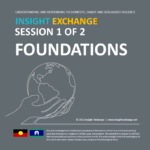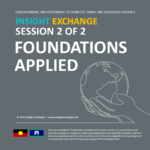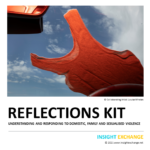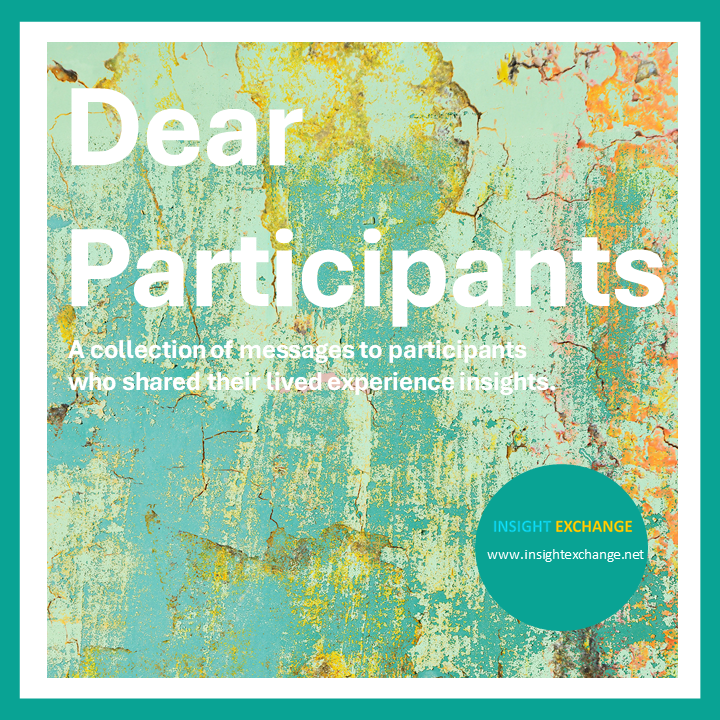Foundations and Foundations Applied
What we understand about domestic, family and sexualised violence informs how we respond: It influences how we design and communicate products, services and systems.
The following videos are part of the Insight Exchange Futures Framework designed to build on your understanding of and responses to domestic, family and sexualised violence.
On this page you can read about the (1) content summary (2) review comments.

(1) Foundations Content summary and link to modules
FOUNDATIONS (45mins) (includes Auslan sign language).
- Introduction
- What is domestic, family and sexualised violence?
- How prevalent is domestic, family and sexualised violence?
- The use of violence and abuse is social, interactional and takes place in a broader context
- Six key Foundational Ideas
- Meaning | Dignity | Deliberation | Resistance to Violence | Responses | Language
FOUNDATIONS APPLIED (40mins) (includes Auslan sign language).
- Lived experience examples and insights
- Responses and Resources
- A. Patterns of support seeking in relation to domestic and family violence.
- B. Every response matters. Every time. Any role.
- C. Being safe is no simple or single decision or task.
- D. The use of control, abuse and violence is a choice.
- Who benefits? Who decides?
While Insight Exchange fully supports lifelong learning via Continuous Professional Development (CPD), we don’t provide individual evidence of attendance.
Sharing and embedding - The Foundations & Foundations Applied modules are free (donated) and can be viewed individually and together in teams. More about Using Insight Exchange.
This Reflections Kit is designed to support individuals, teams, leaders and organisations who are engaging with Insight Exchange to inform their responses to domestic, family and sexualised violence.
The Reflections Kit is a resource collating an outline of the Insight Exchange resources featured in the Futures Framework suite and Foundations and Foundations Applied videos.
Introduction and supports: We suggest providing an introduction that says something like the example below. Adjust/edit as relevant.
Dear [Colleague/Students/Participants/Other],
Understanding domestic, family and sexualised violence is important to our organisation as this informs how we respond. Insight Exchange has donated free access to Foundations and Foundations Applied videos to build on your understanding.
- The Foundations video is 45mins and it explains key statistics, foundational ideas and lived experience insights.
- The Foundations Applied video is 40mins and it introduces resources that apply the foundational ideas. You can use these resources ongoingly via www.insightexchange.net for free as a responding peer, colleague, manager, and as a supportive community member, family member or friend.
- Both videos include supporting visuals, de-identified lived experience examples, short animations and Auslan sign language.
The Foundations and Foundations Applied videos contain descriptions of experiences of and resistance and responses to violence and abuse We recommend choosing a time and space to view these where you have privacy and safety to do so. If the materials raise any concerns for you, you may wish to talk to a person you are comfortable to share with, or to use any of these support contacts listed below [insert list of support contacts your organisation signposts to] or in the My Safety Kit booklet hosted here: www.insightexchange.net/my-safety-kit
The Foundations and Foundations Applied videos are located here: https://www.insightexchange.net/foundations/ [or provide link to where the videos are embedded]
Kind regards, [Insert]
Share your response:
Have you viewed the foundations and foundations applied material and want to share your response? Complete the de-identified feedback form here.
Dear Participants:
Have you viewed the foundations and foundations applied material and want to share a message to the participants who shared their lived experience insights into these resources?
Send us a message on via our Contact Us Page to include in the Dear Participants publication.
(2) Reviews of the Foundations and Foundations Applied:
2021-2022 participants said they wish the following sectors, industries, systems of professions accessed the Foundations and Foundations Applied resource.
- 'All across Australia wide would benefit from this training and resource'. 'Any sector, Every profession, Every workplace'. 'All - public and private sectors'.
- Ambulance, Emergency Services, Hospitals.
- AOD sector
- Australian Defence Force
- Centrelink
- Child & Youth protection
- Construction
- Corporate Workplaces
- Courts
- Domestic and Family Violence Services
- Factories
- Family Law Courts
- Govt departments for community and justice
- Health Care Workers
- High schools
- Housing
- Human Services Industries
- Independent Colleges
- Lawyers & Legal Firms
- Mental Health workers - counsellors/couples therapists & mental health teams
- Migrant resource centres
- Mining sector
- Parole/Justice services/prisons
- Police & Domestic Violence Liaison Officers (DVLOs)
- Relationship Counselling Practitioners
- Religious Bodies
- School Counsellors
- Schools
- Services Australia
- Settlement services
- Sport's club & Social clubs
- Transport
- Universities
Are you a leader or decision-maker in any one of the sectors or industries listed above? Scroll up to read about the ideas of how you can use the Foundations and Foundations Applied in your context.
2022 Reviews of the Foundations and Foundations Applied:
Law School Students (USyd)
The Foundations and Foundations Applied is being used to support foundational understanding of law students early in course work. This approach is designed to establish foundations against which to understand and critique the application of law. Below is a summary by the Associate Professor of feedback comments:
- All students found it beneficial and understood why it was important to have an understanding of these issues broader than the legal context
- Students said that they don’t get this information anywhere else in their degree
- Students recognised that as lawyers they could be part of the systems abuse
- Many students felt that the best part was the point about mutualising language – I think this resonates with lawyers!!
- Students expressed a desire to learn more about the different forms of family violence and the way it impacts diverse people in society.
Other individual responses:
- "Excellent resource easy to follow and navigate." | Facilitator/Counsellor MBC
- "Very clear yet nuanced accounts of a foundational understanding of DFV. Whilst this wasn't necessarily new information for me in this setting, it was certainly very beneficial and I wish I had had this exposure when I was learning about working in this space." | Family Support
- "Very insightful" | Child protection caseworker
- "Great resources" | Community Services and Housing, Domestic and Family Violence, Counsellor/Clinical Supervisor
- "Fantastic!! Especially the resources" | Family Support
- "I am really excited to take a deeper look into Insight Exchange foundations resources. I was not aware of these resources before the training." | Barnardos family connect and support program
- "Videos were really engaging and kept attention to very important information shared. My key insight was about the use of language, grappling with violence as a choice and intentional act." | Social Services
- "My key insight was the Follow My Lead framework." Gov, Community, Frontline Training & Intervention
- "Informative, liked the emphasis on dignity and response and prioritising victims/survivor's stories." | Domestic Violence Service
- "I have had a significant amount of learnings in this area, both professionally, personally and through university teachings and yet I still found myself taking notes and feeling engaged throughout the duration of this session. My key insight is that 'Relationships' do not abuse people, people do'. Language is important! " | CSIRO
- "A reminder of why we are doing this and a reminder to be conscious of practice/ language/ judgements. A focus on resilience and resistance." | Domestic Violence Service
- "My key insight was about dignity, language and resistance." NGO Child Protection
- "Very well presented. Approachable content." Domestic Violence Service
- "Thank you so much for an excellent and informative session. There are many resources and workshops out there about DV, but I really got a lot out of this one because it provoked thought and reflection. I love the focus on meaning and language etc, and the 6 Foundations. Thank you and I will definitely promote it amongst my colleagues." | Psychologist/EAP Provider
2022 participants shared these reflections about what they are going to start, keep or stop doing in response to the material.
I'm going to start:
- Using the I am I can video in our group setting
- Take the time to be mindful about language and documentation
- looking at the insight exchange website
- Supporting the communication of Insight Exchange resources for my network, workplace, and communities
- Continue learning
- Reflecting on my DFV experience and how they have shaped my perception of choice
- Look at my own bias, self reflection
- Including the victims experience empathetically in my work with perpetrators of DV
- Reflect on language used
- Being more aware and mindful of language
- Think about the importance of language when discussing DFVA, the relationship isn't toxic/abusive, the person is using abuse/violence.
- Being open minded
- Be kinder to myself
- More clearly articulate and acknowledge acts of resistance
I'm going to keep:
- Being more aware of the language I use around abusive and violent behaviours
- I am going to continue to explore use of language to support me to reveal responses and resistance and be more curious about what is being done to survivor
- Clearer documentation and pushing for perpetrator accountability
- Broadening my toolbox and resources
- Shifting my language, upholding the victim/survivor's dignity, holding the perpetrator accountable
- Person-centred, holding perpetrators accountable
- Letting victim/ survivors take the lead
- Learning and sharing new ideas
- Challenging the behaviours of perpetrators of DV
- Looking at systems
- Prioritising victim's stories
- Following the lead of those impacted by DFVA to understand their position, needs and wants.
- Listening
- Being an active listener
- Not assume that everyone is going to leave, explore all options validating the clients own insights and decision making
I'm going to stop:
- Believing that all responders are on or even close to the same page
- Blame and pathologise
- Being so hard on myself (and remember to be kind)
- Holding assumptions about victims/survivors and perpetrators and using minimising language for a quicker result
- When listening to perpetrators - focus only on perpetrators story. Now I am going keep in focus the partner.
- One directional thinking and open to universal thinking (holding space for complexities)
- Assumed knowledge
- Assume people always need support when going through DFSV
- Some of my language
2021 Reviews of the Foundations and Foundations Applied:
2021 participants shared these reflections about what they are going to start, keep or stop doing in response to the material.
I'm going to start:
- Listen and reflect more closely as to what clients want/need from their perspective
- Reminding myself that the victim-survivor has had negative experiences beyond just the perpetrator and may be less likely to want to engage as a result, so I need to be patient and honour their circumstances.
- Using language that reveals rather than conceals violence
- Use the My Safety Kit
- Focus on my use of language and behaviour mapping
- Use Extra Resources
- Using the My Safety Kit and My Dignity resource
- In my client work, I may not see the 'partner or ex-partner' but I will seek to sound out or try to hear their voice and resistance. I will strive to be aware of language and communication and how it centers the narratives and intentions.
- Considering dignity as much as I consider safety
- Listen and allow time to share the lived experience
- Try to understand more about who is responding and what they are bringing to that space
- Listen, clarify then respond
- Using the Follow My Lead tool as part of assessment
- Sharing with colleagues and clients
- Follow clients' lead
- Following the victim's lead
- Listen, following a victim's lead.
- Letting the survivor guide the way I work with them.
- Modify my language around domestic violence.
- Looking for the complexity without overwhelming clients, so being more curious and client-led
- Be aware of including the voice of the victim/survivor
- Making sure the report is the whole situation
- Sharing this framework, lens in training and prevention work
- Noting tools of resistance
I'm going to keep:
- Helping clients feel heard
- Listening
- Centralising the voices of women when working with men
- Being persistent, advocating, informing
- Holding the focus on perpetrators of violence
- Updating skills
- Mapping acts of resistance
- To practice more listening and less talking as a way of holding space for intentions and responses to arise.
- Being very aware of mutualising language
- Listening and responding guided by the women/victim to preserve their dignity
- Expecting resistance and seeking to explore it in its complexity
- Unveil abusive behaviours - name them
- Most of my practice
- Helping clients feel heard
- Understand the victim is resisiting
- Listening
- About the person using violence and abuse - Don't make excuses or self blame for the behaviour of another. If they want to change their behaviour they can seek help not apologise and then do it again- take accountability.
- Supporting families wherever possible
- Centering voices of victim survivors
- Engaging with my families
- Talking about the incredible amount of work, often invisible to services, that the victim/survivor is doing in resisting
- Keep functioning with the belief that using violence is a choice
- Responding!
I'm going to stop:
- Listen to my own assumptions
- Dictating what needs to happen
- Rushing to assumptions about clients
- Being fierce
- Using any mutualising language
- Underestimating the importance of social responses
- Assuming
- Blaming the victim
- Jumping in with too much psycho ed
- Using generalised language
- Using language of the perpetrator lost control and say he was in control
- Bias to action and advice
- Excusing behaviour on ‘out of control’ emotions.
- Using normalising language
- Need to keep checking myself around language that is outright victim blaming, colluding or just detached from victims and perpetrators everyday realities.
- Using mutualising language (renewing my commitment to stay vigilant around it)
- Allowing judgements to creep in.




